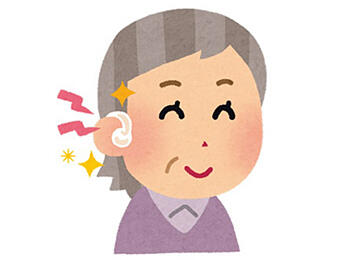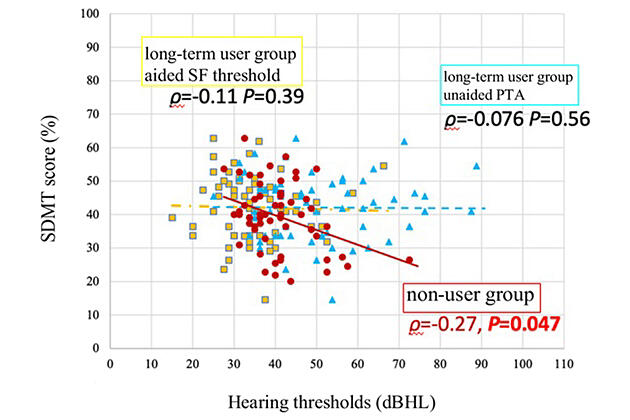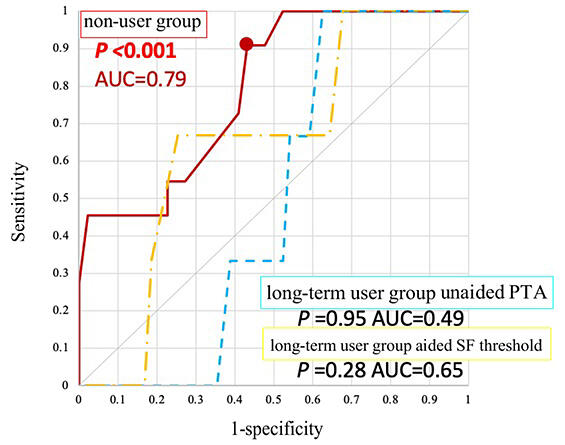Researchers at Keio University have discovered that early use of hearing aids can help prevent dementia when middle-aged and older adults frequently need to ask others to repeat what they've said. The research shows that when someone cannot hear sounds louder than an average of 38.75 decibels across four frequencies, it may increase their risk of dementia. The research group states, "While hearing aids may have a negative image for some people, if you start having trouble understanding everyday conversations, it's better to get 'hearing aid' from a specialist as soon as possible."
Hearing loss has been established as a risk factor for dementia in academic journals such as The Lancet. However, until now, it was unclear at what level of hearing loss intervention with hearing aids would be beneficial. Furthermore, other studies examining the relationship between hearing and dementia used elderly populations as subjects, where age-related hearing loss was already likely to be a factor.

The research team, led by Senior Assistant Professor Takanori Nishiyama, who studies otology and audiology at the Department of Otorhinolaryngology, Head and Neck Surgery at Keio University School of Medicine, studied the relationship between hearing ability and cognitive function in hearing-impaired patients aged 55 and older who visited the Keio University Hospital with complaints of "difficulty hearing" or "ringing in the ears." They divided subjects into two groups: 62 men and women who could hear sounds of 25 decibels or higher at four frequencies (500, 1000, 2000, and 3000 Hz) and had been using hearing aids for more than three years, and 55 people with the same hearing condition who did not use hearing aids.
The researchers focused on the 500-3000 Hz frequency range because these frequencies are crucial for understanding speech and can be treated with hearing aid intervention. For cognitive function testing, they used two different tests: MMSE-J and SDMT. They used two types because the MMSE-J is administered verbally, so hearing-impaired individuals might not even hear the speech.

Provided by Keio University
The results showed that in the non-user group, poorer hearing was associated with decreased cognitive function. In contrast, the hearing aid user group showed no such correlation. It takes at least three months to properly adjust a hearing aid, and after three years of use, it can be considered part of one's daily life. This is why the researchers separated the cases into groups of those who had used hearing aids for three or more years and those who had not.
Further analysis of the non-user group revealed exactly what level of hearing loss was associated with cognitive decline. They found that when people could not hear sounds louder than an average of 38.75 decibels across the four frequencies, their risk of dementia increased.

Provided by Keio University
Nishiyama commented, "In otolaryngology outpatient practice, we found that among people who don't appear to have cognitive decline at first glance, upon testing, a certain percentage of them have mild cognitive impairment." Based on these results, he intends to explain the significance of using hearing aids as dementia prevention for people who cannot hear sounds louder than 38.75 decibels.
In Japan, hearing aids are not covered by health insurance and can be purchased without consulting medical professionals, through mass retail stores or online. However, this convenience leads to complaints such as "I bought an expensive hearing aid but still can't hear well" or "When I said I couldn't hear, they recommended an even more expensive hearing aid."
Another study reported that 99.6% of hearing aids purchased in Japan without going through medical institutions were "incompatible" with the users' needs. Nishiyama advises, "It's better to rent a hearing aid before buying one, and it's best to leave the adjustment period to specialists familiar with hearing aid treatment." He also notes that higher price does not necessarily mean higher quality in hearing aids.
The research was conducted with funding from the Japan Society for the Promotion of Science's Grants-in-Aid for Scientific Research and support from Eisai Co., Ltd. The findings were published in the electronic edition of the British journal NPJ Aging on February 24 and announced by Keio University on March 7.
Original article was provided by the Science Portal and has been translated by Science Japan.




